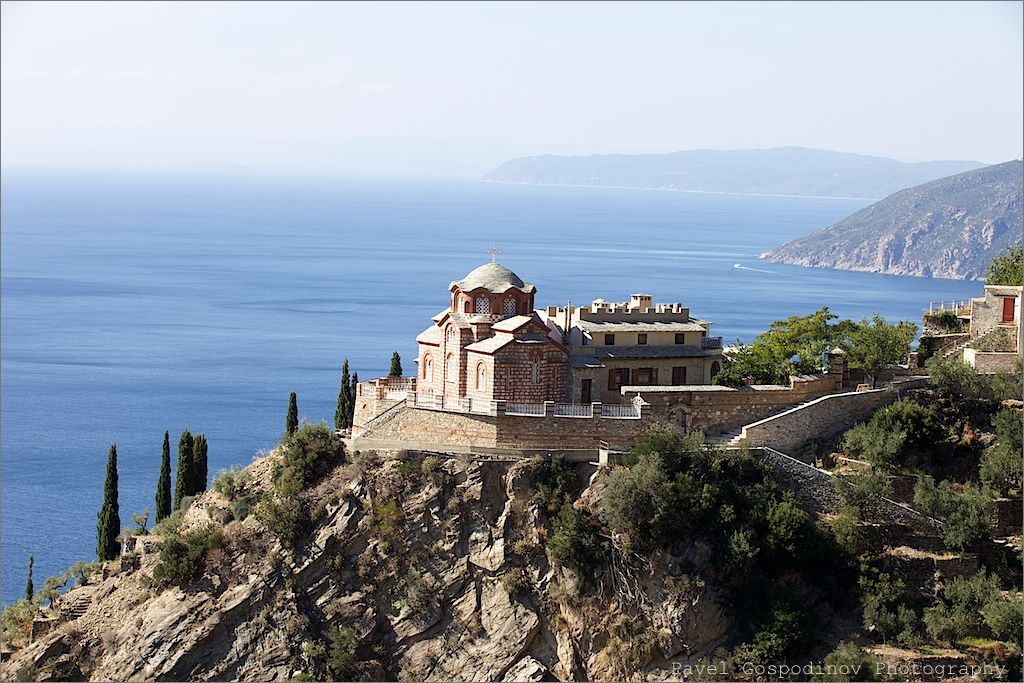
2021至今,伦敦大学亚非学院(SOAS)在读博士 2019-2020,波士顿学院,神学硕士,主修叙利亚传统 2015-2018,波士顿圣十字架希腊正教神学院,主修希腊教父灵修。
Basil Spirituality No. 3: In Defense of Monasticism
This article is designed to refute those who oppose monasticism, clarify their misunderstanding of monasticism, and defend monasticism. Welcome to reprint (please indicate the source). See also my official account articles and personal website articles
In the previous two articles, we have stated that the great Basil believes that the love of God is in everyone, everyone can love God, and love God and love are inseparable, there is no spiritual lone ranger. After a brief discussion of man's fear of God in Article 4 of the Presidency, Basil clarifies the core of his spirituality in Article 5. We divide the core spirit he expounded into two parts. This article will introduce the first part: In order to obey the commandment of loving God and loving others, people should "retreat" from worldly cares, restrain their minds, and change their bad habits. These spirits are also found in Basil's letter to Gregory of Naxion in 358, Letter II. This article will mainly use the content of Regulation 5 and Letter 2 to clarify this point.
The first step of spirituality is: "to throw away all things as rubbish" (Philippians 3:8) for the Lord's sake, "to give up everything" (Luke 14:38) for the sake of discipleship There is no other way. The early church was persecuted, and many Christians gave their lives willingly for the Lord. The blood of these martyrs, precious in the sight of God, became the seed of the church, which made it flourish; after Constantine accepted Christianity in the Edict of Milan in 313, although Christians no longer needed to The main blood sacrificed, but the spirit of the martyrs who sacrificed everything for the Lord did not disappear, but passed on to the monks: they regarded themselves as the bride of Christ, willing to never marry or marry, sold everything for the Lord, and lived a simple life life, work with your own hands, and support yourself. In order to avoid the disturbance and complexity of towns, they came to live in remote villages, wilderness, deserts, caves and other places. This group of people has become an important force for the church to fight against secularization, witnessing that the kingdom of God is not in the world, but in the hearts of people, they are respected as "white martyrs".

1Spiritual practice is a skill that must be achieved with concentration and perseverance
The question of rule 5 is how to avoid distractions, which seems to have nothing to do with obeying the commandment to love God and love others, but for Basil, "no distractions" is a prerequisite for one to love God and love others. He says:
“We must know that if we let our hearts wander, we cannot keep the commandment to love God, nor the commandment to love our neighbor, nor any other commandment.[1]
But why is it that the commandment to love God and love others cannot be kept by being distracted? Basil uses the common sense of life we know to illustrate this truth. He says:"
If a man is always wandering and not persevering, he cannot master any of the arts and sciences. He doesn't have a good start in anything he does, and he doesn't know its purpose. [2]
We Chinese people have all heard the story of "As long as you work hard, you can grind an iron pestle into a needle", which means that no matter what you do, you need to concentrate and persevere to do it, and vice versa. Basil is using this common sense in life to tell us that loving God and loving others is a skill that requires us to concentrate and concentrate on training in order to "practice".

2 What is anxiety? What is distraction?
Immediately after the previous paragraph, Basil said:
It is against the laws of nature to become a blacksmith by making pottery, and one cannot obtain the crown of athlete by the passion of playing the flute. As the mastery of different arts requires proper training, so the training to please God according to the gospel of Christ is achieved by withdrawing from the cares of the world and remaining totally undistracted. [3]
Since each art has its own unique training method, so too, of course, loves God and loves people, which is to "recede from worldly cares and remain completely undistracted." But what is worldly cares? What does distraction mean?
For example, a baby is happy when he eats sweets, and when he sees interesting toys, he wants to reach out and play with it. It is at that time that his mind (although not fully developed) begins to follow his feelings to the outside. Ran. The ancients saw this for a long time. Mencius said: "The officials of the ears and eyes do not think, but hide from things. When things interact with things, they are just cited." That is to say, sensations follow the objects they touch, and we The mind does not realize this, and it is easy to follow the feeling. This movement of mind running outside is called "distraction".
As a baby grows up, he wants more toys, more delicious food, more good-looking, easy-to-wear things. Why does he have this desire? From the physical level, it satisfies his carnal desires, and from the spiritual level, it satisfies his vanity, because his heart has long left home, ran away to wander outside, lost himself, and became a slave of lust and vanity. Over time, this becomes a lust or a bad habit.
In short, when the mind runs outside, it is called worldly cares and distractions. When it gets used to running and develops bad habits, it is called lust. It can be said that worry and distraction are the root cause of bad habits.
As he grew up, he had more opportunities for worry and distraction: worries, worries, and worries filled his study, work, and family life. Those who study, worry that they will not learn well, or that they will not be able to study well all the time, or simply give up their studies in fear of difficulties; those who work, think about promotion and salary increase; those who start a business, think about the fastest recovery of costs and the highest profit; If you are an official, you want to keep your position and get promoted again; if you are single, you want to get married; if you are married, you want to have children; if you have a child, you must first ensure his/her health, and when you grow up, there will be more things to worry about.
These are worldly cares and distractions. As Basil puts it, our hearts are " drawn by countless worldly cares, and we cannot fix our eyes clearly on the Word. "[4]

3 Why is there monasticism?
So how do we get back from it? For Basil, celibacy was the best option. He gave two reasons for this.
First, it is easier for monks to stay away from these worries and distractions. In Rule 6, on whether or not to retire and live alone, he said: "
Living alone helps the soul not be distracted. For living in the midst of ungodly and proud dispositions detracts from our strict observance of the commandments. (cf. Proverbs 22:24-25; 2 Corinthians 6:17)[5]
Obviously, monks have no family and friends, no worldly affairs, and of course it is easier to stay away from the worries and distractions we mentioned in the above example. For those who live in the world, it can be said that they are surrounded by sinners and drawn by all kinds of worries. Those who are close to Zhu are red and those who are close to ink are dark. They should always be vigilant and not distracted. Otherwise, it will be difficult to achieve no worries at all. Like ascending to the sky.
Second, monks are more able to break bad habits undisturbed. According to Basil, our hearts are like wax blocks, on which the bad habits of lust, which had been accumulated by various worries and distractions, have already left their writing on it. He says:"
One cannot write on a wax block without first smoothing it out. In the same way, the divine teaching cannot be imprinted on the mind without first getting rid of the prejudices that come from bad habits. [6]
Apparently the monk has more energy to "erase" the lust that is rooted in his heart. People who live in the world don't have so much time to deal with their vices, and they are in the vortex of worries and distractions, and their hearts are inevitably marked by them. As the saying goes, how can a person walk by a river? Do not wet shoes.
For example, a sister sees a colleague bought a brand-name bag and shows it off everywhere. If this sister is affected, she also wants to buy a brand-name bag and find the value of life. This kind of thinking is like a stone falling into the heart lake. A ripple was stirred up, and her heart could not be calm. This is anxiety, and it will imprint on her heart, consciously or not.

From this point, it can be seen that for Basil, the word of God is not only knowledge that rationally thinks about its principles and then stays in his head, but that God’s words must be lived out through actions.
Furthermore, celibacy comes from the call of the Lord.
First of all, the Lord Jesus himself set an example. He had nothing, remained single, and stayed away from relatives and friends to accomplish the will of God the Father.
Second , the Lord Jesus taught us that practice is one of God's callings. When the disciples asked Jesus, "If the man and his wife are like this, it would be better not to marry." Jesus said, "This is not something that everyone can accept. Only whoever is given it can receive it. For some are eunuchs by birth, and some are received. There are eunuchs, and there are eunuchs who are eunuchs for the sake of the kingdom of heaven. Whoever can accept these words can accept them. (Matt. 19:10-12)” Here, according to the traditional understanding of the church fathers, “eunuchs for the sake of the kingdom of heaven” refers to It is a way of life of celibacy for the Lord.
Furthermore , Paul followed this way of life, and Basil also quoted him as saying its benefits: "I wish you nothing to worry about. Those who do not have a wife worry about the things of the Lord, how to please the Lord. but worry about the things of the world, how to please his wife.” (2 Corinthians 7:32-33)
4 Every Christian should "retreat" to restrain his mind and cut off his lusts
However, for Basil, "returning" is the task of every Christian. Although becoming a monk is the most beneficial to "returning", it does not mean that only monks can complete this task, or that monks can complete this task. Therefore, Basil said:
"Because I am indeed far away from the life of the city, as I have escaped from many evils, but I have not been able to let go of myself." [7] He went on to make an analogy, like a sailor who has just set out to sea, not only seasick, but also affected by all kinds of lust. Tossed by the storm, in short, although his body fled from these worries and distractions, his heart was not yet at peace. Because "retreat" is to make one have the energy to cut off lust and make the mind calm. In Epistle 2, he said: "To withdraw from the world does not mean to leave it with the body, but to cut off the attachment of the mind to the body."[8]
In Rule 5, he makes it clearer: "Whoever truly wants to follow God must cut off the fetters of the lusts of this life, and this is done by completely turning away from and forgetting the bad habits of the old self. If we do not follow If we exile ourselves in carnal care and the indulgences of this life [9] (as the apostle said: 'We are citizens of heaven, (Philippians 3:20)'), we will not be able to please God, because the Lord especially Said: 'Then any of you who do not leave all that he has cannot be my disciple (Luke 14:33)'" [10]
When talking about the examples of worry and distraction above, it has already been mentioned that all lusts and bad habits are caused by the mind forgetting God from infancy, and going "outside" to "walk around" following the feeling. If lust and bad habits are the disease, then the mind running outside is the root of the disease, and Basil's prescription is to treat both the symptoms and the symptoms. Because, in Rule 5, he first talks about the first exercise of loving God and loving people—“retreat” to close the heart, and then he talks about the second exercise—cutting off lust and bringing the mind back to peace.

5 Significance and application of monasticism to today's society
- Tell this generation that the kingdom of God is not in this world
Just imagine, in today's China, who would sell everything for Christ, resign from their positions, and become a monk in the wilderness, deep mountains, and other places where there are few people? Is it an official? Are you rich? Do you have a car and a house? No car, no house, no money? Such people are extremely rare, and if there are any, they are also "marginal" groups in this society. Because this society is tied together by riches and glory—the devil's third temptation to Christ. If there is really one person willing to do this, how will others see it? Will he be as well known as Basil's era? On the contrary, others will laugh at him, and may even call him "sick of the brain".
However, it was not his brain that was sick, it was this crooked and rebellious generation that was sick, and it was not light. Because on the one hand, he avoids worry and distraction, like avoiding the new coronavirus, and is willing to fight sin to the point of bloodshed; on the other hand, he will participate in some social volunteers, serving the orphans, widows, and the sick - Basil's contribution in this regard In particular, his statutes and the institutes he established deeply influenced Catholic religious traditions. According to a brother who came into contact with Catholicism, many Catholic congregations in China are involved in social services, such as caring for orphans, sick people, hospice care, and lepers. Many nuns have been doing it for more than ten years.
However, in today's society, such people, as Paul said, would be "considered the filth of the world, the dross of all things." (1 Corinthians 4:13)" Therefore, if one day in China, monasteries will bloom everywhere, occupying famous mountains and rivers, Then they will be like a city on a mountain and become one of the witnesses of the kingdom of God. On the one hand, it will announce to the world that the kingdom of God is not in the world. and ridiculous.
- Justifying Monasticism and Dispelling Misconceptions About It
Many Protestants have a "negative" attitude toward monasticism and have trouble understanding it. Recently, when a pastor introduced Martin Luther, he mentioned that the Reformation opposed the spiritual model of monasticism, which is abstracted from the world. They do not want to overthrow the spirit of monasticism, but advocate that spiritual pursuits cannot be separated from the world, and spiritual practice cannot be purely exemplary and self-contained. Some people say that Calvin was against monasteries because he saw the whole world as a monastery, and he wanted believers to practice the spiritual practice of 'in the world and not in the world'.

Obviously, this passage should represent many Protestants' "negative" views of monasticism. However, these are misunderstandings of monasticism. I'm here to clarify where these misunderstandings lie.
First of all, Basil also rejects monasticism as "withdrawing" or "withdrawing" from the world, because he says "withdrawing from the world does not mean leaving it physically." The Gospel of John also says: "I do not ask you to ask them to leave the world, but only Please keep them from the evil one (John 17:15).” The monks refuse to have jobs in the world, do not live in towns, but choose to live in sparsely populated places. This does not mean that they are separated from the world, it only means that they can In order to cut off worldly concerns, they choose to live a relatively quiet, undisturbed life.
Moreover, they kept in touch with the world, because in Basil's time, monks were respected, there were many Christians living in the world, and even dignitaries often visited these monastic places, and experienced monks would give them spiritual advice. , guide their lives. Not only that, the monks will also be invited by bishops and priests to participate in some social service and teaching work, and they maintain close contact with the church and lay people.
Second, monasticism is also not "alone" because Basil rejects "spiritual loners", and one comes out to monasticism into a monastic community, as Basil states in Rule VII, in which, He can also fulfill the commandment to love others. Moreover, in the example of the Catholic religious order above, many religious institutes also have the function of social service. How can it be said that it is "self-contained"?
Thirdly, monasticism is not "exemplary" either, because the way of life of monks is called by the Lord, whoever is given by the Lord is who, and there is no question of whether to demonstrate or not to demonstrate.
Finally, why do people want to practice Taoism? I think this article has made it clear that a Christian chooses to become a monk in order to serve the Lord exclusively, to be called by the Lord, and to "retreat" more thoroughly from worldly concerns and distractions, because the life of a monk is In a way that frees him from the entanglement of worldly affairs, he simply serves the Lord.
So, what reason do we have for rejecting monasticism? For the single brothers and sisters in the church, who can be sure that the Lord will not call some of them to remain single and serve the Lord wholeheartedly? Who can mock and slander those whom the Lord has called?

- How Christians in the World "Go Back" and Stay Undistracted
Although Basil does not give specific advice on "falling back" for Christians living in the world, but based on its basic principles, I think you can try to do it from the following five points. Five specific recommendations
- No matter what you do, do it without distraction and concentrate on it, as if you were doing it before the Lord . This principle prevents us from being distracted while doing things. In other words, when you work, when you focus on work, when you study, when you focus on your studies, when you take care of your kids, when you focus on babysitting, when you cook, when you focus on cooking, etc. If you get distracted while doing something, turn back and focus on it right away.
- Practice reading the Bible, praying, eating less, and meeting regularly. Set aside a quiet time every day, a quiet place to read the Bible and pray.
- Live a simple life and take out the time for "leisure and entertainment". For example, take the time to use your mobile phone, watch movies and TV, and play games to pray and sing songs, and get close to God.
- Dedicate the "intermittent" time from work, study, and family care to God and pray to God.
- Don't worry about what to eat , what to wear, or what to drink (see Matthew 6:25-34).
The above five suggestions are what I think Christians living in the world should practice "regressing", and then, on this basis, slowly get rid of the bad habits that they have developed.
[1] Θεολ. Ν. Ζησης and Βας. Ψευτογκας eds. The great Basil of Caesarea: Answer works 8, ascetic A (βασιλειου καισαρειας του μεγαλου απαντα τα εργα 8, ασκητικα α') (Thessaloniki, Greece: πατερικαι εκδοσεις <γρηγοριος ο παλαμας>, 1973), 202-204. Below is abbreviated as "Long Guild Rules".
[2] The Long Statute, 204.
[3] Ibid
[4] Deferari R. trans. Saint Basil: The Letters , vols.1 (MA: Harvard University Press, 1926), 9. hereinafter referred to as "the letter"
[5] The Long Statute, 212.
[6] Letter, 11.
[7] Letter, 9.
[8] Letter, 11.
[9] The original text is κοινωνίας, which is mostly translated as intersecting. But here it specifically refers to the fetters of human relationships, and has a negative connotation. In other words, we cannot give up loving God because of the fetters of human relationships such as parents, children, husband and wife, and friends. On the contrary, for the sake of loving God, we should first cut off the fetters of this kind of human relationship, so that we can love others properly. Because as I said in the previous article, if there is no love for God as the foundation, the lover will be selfish.
[10] Long Statutes, 204, 206.
Like my work?
Don't forget to support or like, so I know you are with me..
Comment…